
Pew Research Center conducted this study to understand Americans’ views of men and masculinity at a time when these topics are at the forefront of national conversations.
For this analysis, we surveyed 6,204 adults from Sept. 3 to 15, 2024. Most of the respondents who took part in this survey are members of the Center’s American Trends Panel (ATP), a group of people recruited through national, random sampling of residential addresses who have agreed to take surveys regularly. The survey also included an oversample of Black and Hispanic adults from the SSRS Opinion Panel, another probability-based online survey web panel recruited primarily through national, random sampling of residential addresses. Surveys were conducted either online or by telephone with a live interviewer. The survey is weighted to be representative of the U.S. adult population by gender, race, ethnicity, partisan affiliation, education and other factors. Read more about the ATP’s methodology.
Here are the questions used for this report, the topline and the survey methodology.
References to White, Black and Asian adults include those who are not Hispanic and identify as only one race. Hispanics are of any race.
All references to party affiliation include those who lean toward that party. Republicans include those who identify as Republicans and those who say they lean toward the Republican Party. Democrats include those who identify as Democrats and those who say they lean toward the Democratic Party.
The status of men in American society has been at the center of recent national political conversations. Some people have spoken out about what they perceive to be attacks on traditional manhood, while others have warned about what they see as “toxic masculinity.” More broadly, many have expressed concern about how men are doing socially and economically.
Amid these conversations, we asked 6,204 U.S. adults about their views on men and masculinity. Our survey covered traits people think are valued too much or too little in men these days; how acceptable they think certain behaviors are in men; and how they think men have fared relative to women in various aspects of life. The survey was conducted Sept. 3-15, 2024.1
Key findings
Relatively few Americans say people have negative views of masculine men.
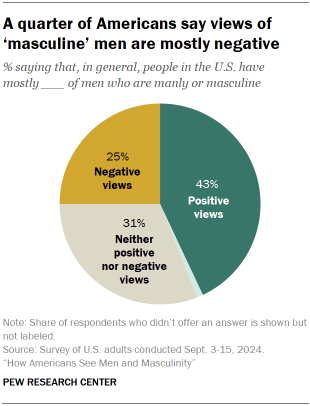
- 25% say people in the United States have mostly negative views of men who are “manly or masculine.” This is smaller than the shares who say people have mostly positive views of masculine men (43%) or that views are neither positive nor negative (31%).
- But among Republican men, 45% do think people have negative views of masculine men, and the vast majority of those who feel this way say this is a bad thing. Much smaller shares of Republican women (24%), Democratic men (20%) and Democratic women (13%) say people view masculine men negatively. (Republicans and Democrats include those who lean toward either party.)
Majorities of Americans say most people in the U.S. don’t place enough value on men who are caring, open about their emotions, soft-spoken or affectionate.
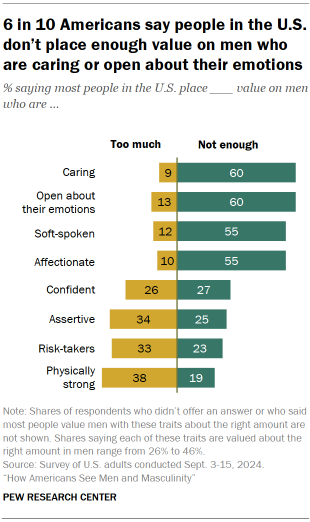
- Democrats are more likely than Republicans to say people don’t value men with these traits enough. But even among Republicans – including among Republican men – more say these traits aren’t valued enough in men than say they are valued too much.
Views are more mixed when it comes to traits that tend to be associated with traditional masculinity.
- On balance, the public leans toward saying that people in the U.S. place too much rather than too little value on men who are physically strong, assertive or risk-takers. About four-in-ten adults or more say most people value these traits in men about the right amount.
- Men and Republicans are more likely than women and Democrats, respectively, to say these traits aren’t valued enough in men.
Majorities of men and women find certain behaviors that could be associated with “toxic masculinity” to be unacceptable.
- About six-in-ten Americans or more say it’s not too or not at all acceptable for men to join in when other men are talking about women in a sexual way (75%); to have many different sexual partners rather than commit to one relationship (69%); to drink a lot of alcohol when out with friends (63%); or to throw a punch if provoked (62%).
- While there are some differences in views across gender and party lines, majorities of men, women, Republicans and Democrats see these behaviors as unacceptable.
About four-in-ten men (42%) see themselves as highly masculine.
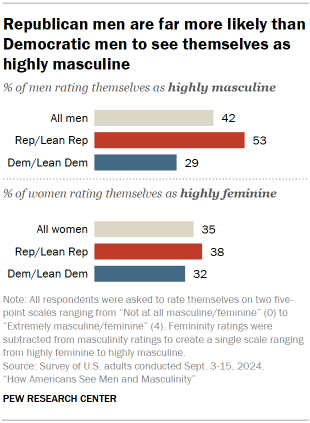
- A similar share (43%) say they lean masculine, while 11% are neither masculine nor feminine or equally both. Another 4% say they either lean feminine or are highly feminine. (Read Chapter 6 for more detail on how we constructed the masculinity-femininity scale.)
- Among women, 35% rate themselves as highly feminine. A larger share (46%) say they lean feminine, while 15% are neither feminine nor masculine or both equally. And 4% say they either lean masculine or are highly masculine. (The number of people in the survey who do not identify as a man or a woman is too small to analyze separately.)
- Men and women under 30 are less likely than their older counterparts to rate themselves as highly masculine or highly feminine, respectively.
- A much larger share of Republican men than Democratic men rate themselves as highly masculine (53% vs. 29%). The partisan difference is much more modest among women: 38% of Republican women see themselves as highly feminine, compared with 32% of Democratic women.
Most Americans say women are doing better than they were 20 years ago when it comes to getting leadership positions at work, getting a well-paying job, and getting into a college or university.
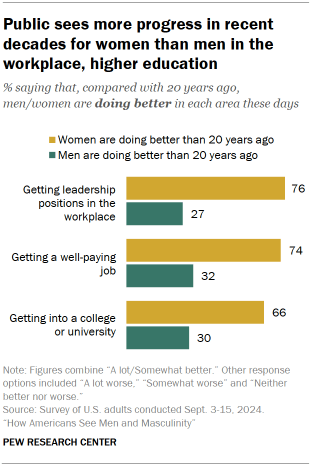
- The shares saying this are much larger than the shares who think men have made progress in these areas.
- Pluralities say men are doing neither better nor worse in these areas compared with 20 years ago.
- Republican men are especially likely to say men are doing worse in these areas today than in recent decades.
Despite seeing more progress for women than for men in the past two decades, most Americans (81%) don’t think the gains women have made in society have come at the expense of men, according to an April 2024 Pew Research Center survey.
- Majorities across gender and party lines share this view, though Republican men are less likely than those in other groups to say women’s gains haven’t harmed men.
- About three-in-ten Republican men (31%) believe women’s gains have come at the expense of men, compared with 16% each among Democratic men and Republican women, and just 9% of Democratic women.
Jump to read more about:
- Views of men and masculinity
- Behaviors people find acceptable and unacceptable in men
- Views of the progress men and women have made in different life areas
- Views of the impact of changing gender roles
- How Americans see differences between men and women
- How men and women rate their own masculinity and femininity
Other important findings
About two-thirds of men (66%) say their father influenced their views about what it means to be a man a great deal or a fair amount.
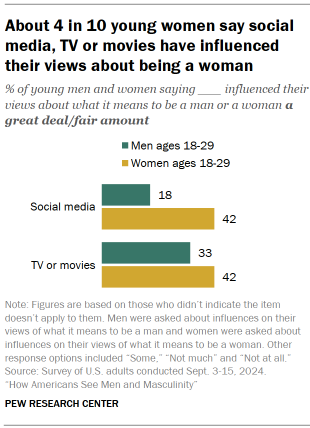
- The same share of women say this of their mother’s influence on their views about what it means to be a woman.
- While 47% of men say their mother has had at least a fair amount of influence on their views about being a man, a smaller share of women (32%) say their father has influenced their views about being a woman. (These figures exclude those who say each item doesn’t apply to them).
Young women are much more likely than young men to say social media has had a lot of influence on their views about their gender.
- About four-in-ten women under 30 say social media and TV or movies have had a great deal or fair amount of influence on their views of what it means to be a woman. Among young men, 18% say social media has influenced their views of what it means to be a man, and 33% say this about TV or movies.
Most Americans say men and women are basically different in many ways, but there is no consensus on whether society or biology drives these differences.
- The view that men and women are different in how they express feelings, their physical abilities, their approach to parenting, and their hobbies and personal interests is widespread across gender and party lines.
- But while women and Democrats tend to point to societal expectations as the main reason for these differences, men and Republicans largely cite biological differences between genders as the reason.
A majority of Americans (57%) say men and women are basically similar in the things they are good at in the workplace.
- There are wide partisan gaps in these views: 68% of Democrats say men and women are similar in this regard, compared with 47% of Republicans.
- 64% of Democrats who see differences in this area say they are rooted in societal expectations for men and women, while 61% of Republicans point to biology.
The public sees women as benefitting more than men from changing gender roles at work and in the family.
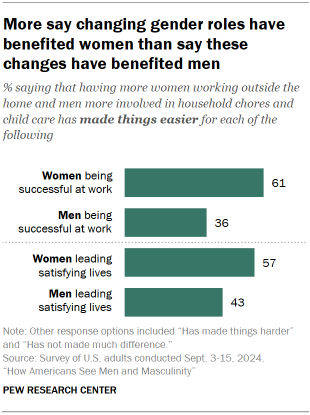
- Majorities say the fact that more women now work outside the home than in the past and men are more involved in household chores and child care has made it easier for women to be successful at work (61%) and to lead satisfying lives (57%).
- Fewer than half say changing gender roles have made it easier for men to be successful at work (36%) and to lead satisfying lives (43%).
- 57% of Americans say changing gender roles have made it easier for families to earn enough money to live comfortably. A smaller share (47%) says the same about the impact on marriages being successful.
A majority of Americans (57%) say it’s extremely or very acceptable for men to take care of the home and children while their wife works for pay.
- About a third say the same about men taking charge in day-to-day decisions about their relationship (35%) and splitting the bill when out on a date (34%). (For this question, respondents were asked to think about men who date women or are in a relationship with a woman.)
- 23% say it’s highly acceptable for men to take their wife’s last name when they get married.
About four-in-ten Americans (42%) say it’s extremely or very acceptable for men to put a lot of effort into their style or fashion choices.
- 22% say the same about men playing video games on a regular basis.
- Men and women under 30 are more likely than their older counterparts to say each of these is extremely or very acceptable.




